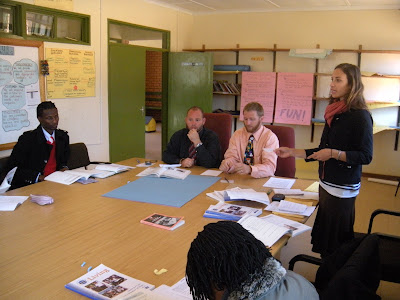The Botswana Ministry of Education has created a curriculum of basic life skills (which is where my title of Life Skills Volunteer comes from), and has additionally linked each topic to the HIV epidemic. A “life skill” could be anything from self-awareness, to decision making, to risk taking, to healthy living. It’s basically, um, a skill you use in your… life. Life skills. Yeah.
The curriculum is used by guidance teachers in all the schools. The Ministry of Education also aims for every teacher to use the curriculum in their own classes. Taking an objective from the Life Skills curriculum and using it in conjunction with an objective from a teacher’s own curriculum is called “infusion.”
Unfortunately, the Ministry of Education never actually trained teachers on infusion. Instead, they just gave out the Life Skills textbooks and said, “Have fun.” Since infusion is not second nature and gets increasingly more difficult as students get older, this resulted in no teachers infusing. Ever.
Two volunteers who were a year ahead of me (meaning their service finished in June) invited my best friend Paco and I to participate in an Infusion Workshop they were holding in a village called Malwelwe (yeah, just try to pronounce that name, I dare you). The idea was that Paco and I would learn how to run the workshop and bring it back to our region, thereby training even more teachers on how to infuse.
The workshop in Malwelwe was fantastic. First of all, we stayed with a teacher whose nickname was Chucks – I mean, you just know a woman called Chucks is going to be awesome. The hospitality, generosity, and fun nature of the teachers at Malwelwe Primary just blew me away.
Additionally, these teachers were really into learning about infusion – how to do it, when it’s appropriate, and tips and tricks for infusing more difficult topics like science and agriculture. With all of our presentations the teachers were engaged and attentive, and they seemed truly appreciative that we were trying to help their school.
 |
| I gave a session introducing how to plan an infused lesson |
After a morning of introducing Life Skills and infusion, we had an afternoon of lesson planning. The four of us Peace Corps volunteers went around the room, working with each teacher individually as he or she planned an infused lesson. The teachers couldn’t just pick any topic, however – we had them plan a lesson that they were going to do with their class the very next day. Having the hands-on session of lesson planning helped tie in all the presentations from the morning, and the teachers really seemed to pick up the goals behind infusion.
 |
| KG, Lucas, and John, who set up the workshop |
 |
| Assisted lesson planning |
The drive behind the entire Life Skills program is the HIV epidemic and, more generally, sexual health. Sexuality is not exactly an easy thing to talk about in the classroom, especially for the first time. We played a game with the teachers to lighten the mood as well as to get them comfortable with talking about different aspects of sex. The game is called Abstinence or Not. The teachers had to decide whether partaking in certain intimate activities (kissing, holding hands, etc.) was abstaining or not. The game really gets people thinking about what abstinence actually means. I think the funniest part was when we called out “mutual masturbation.” One teacher turned to me and said, “Wait, what does that mean? Who is touching who?!” It was a fun way to make sure the health/HIV objectives of Peace Corps Botswana were addressed during the workshop.
 |
| Explaining the rules of the game |
 |
| Fun with abstinence |
The next day, the four of us volunteers split up and observed the teachers during their infused lesson, and then gave the teachers feedback. There were some teachers that were still struggling with the concept, but overall we mostly had positive things to say. Here are some great examples of infused lessons: agriculture and goal setting; Setswana and communication; mathematics and decision making.
What made this 2-day workshop a success was truly the open-mindedness and willingness of the teachers to learn. Paco and I are looking forward not only to bringing this workshop to other schools, but to a follow-up visit to Malwelwe!






